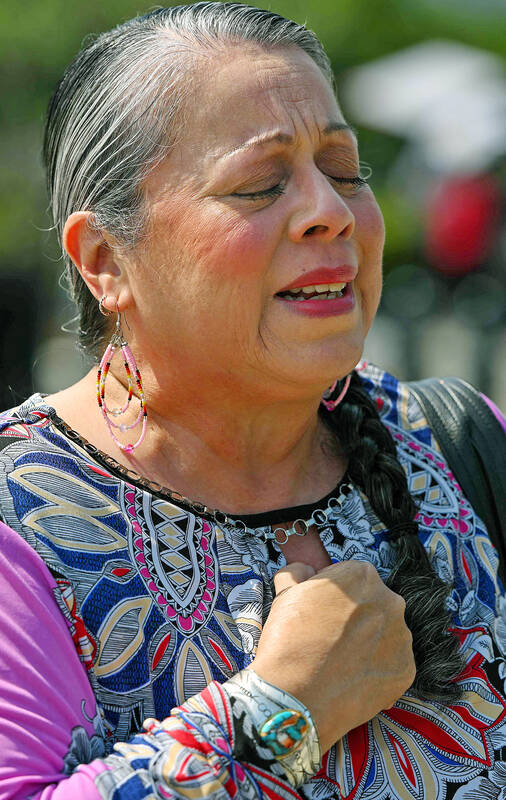The US Supreme Court on Thursday upheld a law that gives native American families priority in adoptions and foster care placements of indigenous children.
In a 7-2 vote, the court rejected challenges to the US’ Indian Child Welfare Act (ICWA) brought by a non-native American couple seeking to adopt an indigenous child and the state of Texas.
They had said that the ICWA, passed by the US Congress in 1978, was unconstitutional and discriminates on the basis of race.

Photo: AFP
“The issues are complicated,” said US Justice Amy Coney Barrett, who authored the majority opinion.
“But the bottom line is that we reject all of petitioners’ challenges to the statute, some on the merits and others for lack of standing,” said Barrett, who is the mother of two adopted children of Haitian origin.
Like in Canada, native American children in the US were for decades removed from their biological parents and placed in boarding schools or with non-indigenous families as part of a policy of forced assimilation.
Congress sought to bring an end to the practice with the passage of the ICWA, which set strict standards for removing native American children from their parents, and required indigenous families to receive priority for foster care placements and adoptions.
Republican-led Texas, as well as families restricted by the ICWA from adopting native American children, filed a legal challenge under the US Constitution’s 14th Amendment, which limits the differentiation between citizens on the basis of race.
Several native American tribes, backed by the administration of US President Joe Biden and rights organization American Civil Liberties Union (ACLU), said that the law was not based on race, but on indigenous groups’ sovereign rights.
Under US law, native American tribes have a special status with their own legal jurisdictions and court systems.
The US Supreme Court intervened in the case after lower courts issued divergent opinions.
Biden welcomed the court ruling.
“Our nation’s painful history looms large over today’s decision,” he said in a statement. “In the not-so-distant past, native children were stolen from the arms of the people who loved them.”
“The Indian Child Welfare Act was passed to protect the future of tribal nations and promote the best interests of native children, and it does just that,” he said.
The ACLU called the ruling a “landmark victory for tribal sovereignty.”
“Tribes have a fundamental right to govern themselves and make decisions on issues that affect their own people — including native children — without interference from federal or state governments,” ACLU’s Racial Justice Program staff attorney Crystal Pardue said.
“Native families have a right to stay together, care for their children and preserve tribal culture by ensuring access to their cultural identity, language and heritage,” Pardue said.
The ACLU said that despite the court ruling, the “work is far from over.”
“Today, states still continue to remove native children from their families and tribes at alarmingly high rates,” the rights group said.

Seven people sustained mostly minor injuries in an airplane fire in South Korea, authorities said yesterday, with local media suggesting the blaze might have been caused by a portable battery stored in the overhead bin. The Air Busan plane, an Airbus A321, was set to fly to Hong Kong from Gimhae International Airport in southeastern Busan, but caught fire in the rear section on Tuesday night, the South Korean Ministry of Land, Infrastructure and Transport said. A total of 169 passengers and seven flight attendants and staff were evacuated down inflatable slides, it said. Authorities initially reported three injuries, but revised the number

A colossal explosion in the sky, unleashing energy hundreds of times greater than the Hiroshima bomb. A blinding flash nearly as bright as the sun. Shockwaves powerful enough to flatten everything for miles. It might sound apocalyptic, but a newly detected asteroid nearly the size of a football field now has a greater than 1 percent chance of colliding with Earth in about eight years. Such an impact has the potential for city-level devastation, depending on where it strikes. Scientists are not panicking yet, but they are watching closely. “At this point, it’s: ‘Let’s pay a lot of attention, let’s

‘BALD-FACED LIE’: The woman is accused of administering non-prescribed drugs to the one-year-old and filmed the toddler’s distress to solicit donations online A social media influencer accused of filming the torture of her baby to gain money allegedly manufactured symptoms causing the toddler to have brain surgery, a magistrate has heard. The 34-year-old Queensland woman is charged with torturing an infant and posting videos of the little girl online to build a social media following and solicit donations. A decision on her bail application in a Brisbane court was yesterday postponed after the magistrate opted to take more time before making a decision in an effort “not to be overwhelmed” by the nature of allegations “so offensive to right-thinking people.” The Sunshine Coast woman —

BORDER SERVICES: With the US-funded International Rescue Committee telling clinics to shut by tomorrow, Burmese refugees face sudden discharge from Thai hospitals Healthcare centers serving tens of thousands of refugees on the Thai-Myanmar border have been ordered shut after US President Donald Trump froze most foreign aid last week, forcing Thai officials to transport the sickest patients to other facilities. The International Rescue Committee (IRC), which funds the clinics with US support, told the facilities to shut by tomorrow, a local official and two camp committee members said. The IRC did not respond to a request for comment. Trump last week paused development assistance from the US Agency for International Development for 90 days to assess compatibility with his “America First” policy. The freeze has thrown